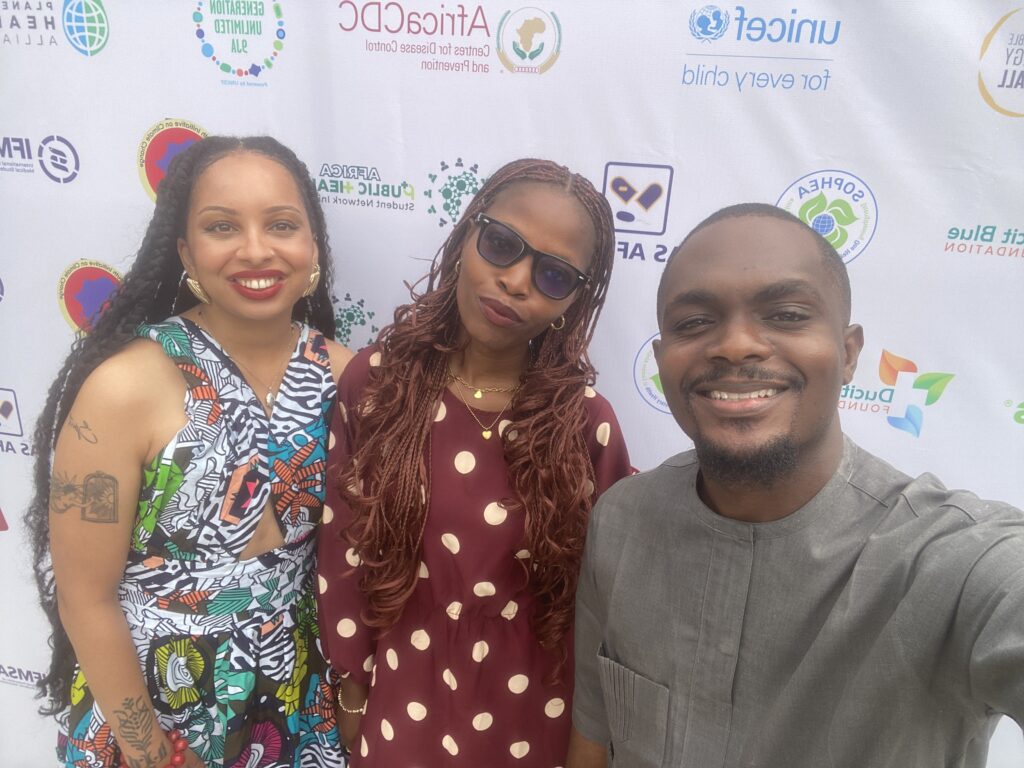Last week marked a significant milestone in the Public Health community as the Africa Public Health Student Network Initiative (AfricaPHSN) hosted its Public Health Student Summit at the University of Lagos, Yaba. We had the honour of being invited to moderate several sessions and presented an abstract titled “Addressing the Non-Economic Impacts of Climate Change in Africa”.
The three-day event brought together emerging public health professionals, scholars, and advocates across the continent. We were ably represented by our Head of Research and Communications, Hope Lekwa, alongside our TEAP Project Lead, Svetlana Onye, and TEAP Project Manager, Ayomide Olude, who actively contributed to the discussions and shared valuable insights into the intersection of climate change and public health.

Day 1- Case study presentation on Addressing the Non-Economic Impacts of Climate Change in Nigeria
On the first day of the summit, during the opening ceremony, Svetlana presented her poem, A Memory or a Dream. This evocative piece was centred on the intergenerational relationship with nature, drawing from her father’s experiences growing up in Kaduna and Amaimo, and contrasting them with the current environmental issues in various parts of Nigeria.
Later in the day, Lekwa delivered a presentation on the Non-Economic Impacts of Climate Change in Africa. He discussed how climate change is fundamentally a public health issue and also highlighted the crucial role of mental health resilience in both adapting to and mitigating its effects. Lekwa emphasized that mental resilience is just as essential as other forms of support in the fight against climate change. He also underscored how inadequate mental health support can exacerbate broader public health challenges, stressing that robust mental well-being is necessary for effectively addressing public health issues.
Day 2- Understanding Eco-anxiety in Young Africans
Day 2 of the summit was equally engaging during our session. We had Svetlana moderate a compelling discussion on Understanding Eco-Anxiety in Young Africans. This session brought together a diverse panel of young voices who delved into the emotional impact of environmental challenges on youth across the continent. The session featured Amarachi C. Nwuneli, an activist and social innovator; Shelot Masithi, the Founder of She4Earth; and Tariq Lawal, an artivist and changemaker. These speakers shared their personal experiences and insights into how climate change profoundly affects the mental health of young people and how they manage it.
The participants were highly attentive throughout the session and deeply engaged with the topics being discussed. Their active involvement in sharing their personal experiences of environmental impacts on their mental health underscored the importance of addressing mental health within the broader context of environmental activism and sustainability efforts. The session ultimately emphasized that supporting young people emotionally is key to fostering a resilient generation capable of driving meaningful change.

Day 3- Climate Aware Psychosocial Support In Climate Disasters
On the final day, we hosted a virtual workshop focused on Climate-aware Psychosocial Support during Climate Disasters. This insightful session was led by Professor Kenneth Yongabi, a renowned expert in public health and climate science. Professor Yongabi emphasized the critical importance of providing psychosocial support in the aftermath of climate disasters, highlighting the profound psychological trauma these events can cause on people, citing different case studies of people who had been impacted.
The session delved into practical approaches for supporting individuals and communities to cope with the emotional and mental health challenges that arise during and after such disasters. He also provided valuable insights into integrating climate awareness into psychosocial support strategies, emphasising that affected populations should and must receive the comprehensive care needed to recover and build resilience in the face of future climate-related events.
Conclusion
We are incredibly grateful to the Africa Public Health Student Network Initiative (AfricaPHSN) for inviting us to the Africa Public Health Student Summit. Truly the summit was a resounding success that offered a platform for crucial discussions at the intersection of climate change and public health. Our participation at the summit once again showed our commitment to youth-led climate action, particularly in the areas of mental health and psychosocial support.
The summit also served as a powerful testament to the need for more cross-disciplinary discourse on climate change and human well-being. As climate impacts aren’t just an environmental issue but a complex challenge that intersects with public health, mental health, social justice, economic stability and others. Addressing these multifaceted impacts requires collaboration across various fields—public health professionals, climate scientists, mental health experts, and policymakers must work together to develop holistic strategies that promote resilience and sustainability. As we move forward, the knowledge and experiences exchanged at this summit will undoubtedly fuel our ongoing efforts to build resilience and foster sustainable development across Africa
